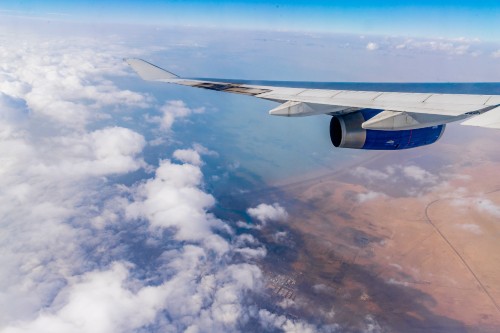The snapshot survey, conducted by researchers at the university’s Cabot Institute for the Environment, captured views of nearly 500 respondents about how they might fly in the wake of the global pandemic.
Dr Ed Atkins, who led the study, said: “The huge impact of the pandemic on the aviation industry has been widely reported as air travel has ground to a virtual halt, resulting in significant job losses and many countries providing financial support to the sector.
“So far, little research has been done to explore whether, and why, passengers might return to flying in the future. This survey aims to provide early insights into how the pandemic might affect their attitudes towards flying and the frequency with which they plan to do so going forward. This has important consequences for the hundreds of thousands of people who rely on this sector for their jobs and livelihoods.”
Overall, six in 10 respondents (57.7 per cent) said after they have been vaccinated their air travel would reduce, with nearly a third (30.9 per cent) saying they would fly less and more than a third (36.6 per cent) saying much less so in future. Conversely, only one in 20 (5.7 per cent) plan to fly more often.
The online survey, completed between March and April 2021, found this apparent reluctance to fly increased among older people. While around a third (34.5 per cent) of respondents aged between 18 and 29 years think they will fly less or much less than before the pandemic, this proportion rose to nearly three-quarters (73.1 per cent) among those aged 60 and above.
Concerns relating to COVID-19 and climate change were both identified to a similar extent by respondents as key factors which may put them off flying in future – 76.9 per cent and 73 per cent respectively. More than half (54 per cent) cited COVID-19 transmission as a potential reason not to fly, while nearly a quarter (22.9 per cent) mentioned measures to reduce transmission, such as social distancing or wearing face masks. Furthermore, the vast majority of respondents (83.6 per cent) acknowledged their personal use of air travel contributes to climate change.
The study adds further insights following results of a YouGov poll last July, which showed two-thirds (64 per cent) of Britons would not feel safe travelling by plane, a substantial jump from less than a third (31 per cent) the previous month, despite the first national lockdown beginning to ease.
The study findings also echo a recent Ipsos poll which revealed 71 per cent of adults globally agreed that, in the long term, climate change is as serious as COVID-19 and two-thirds of respondents supported climate change being prioritised in the ensuing economic recovery.
Although the survey attracted 478 responses from adults of all ages, there was greater representation from older people, with four in 10 respondents (39.8 per cent) respondents aged 60 and above. The study, funded by the Cabot Institute for the Environment, has not been peer-reviewed.
More detailed analysis of the preliminary findings is underway and online focus groups are planned to further explore related topics. These include consideration of the role of aviation in the transportation of goods and how the majority of air travel for holidays, as well as work is mainly undertaken by a relatively small proportion of the UK population.
Dr Atkins, Lecturer in the School of Geographical Sciences, said: “The role of the aviation sector within any ‘green recovery’ from COVID-19 remains unclear, but in some countries, such as France, domestic flights are being restricted and financial support has been linked to decreasing greenhouse gas emissions. This could serve as a model for others to follow.
“Although the survey doesn’t show people’s values or how these may influence their behaviour, it provides some useful insights into potential future trends regarding their flying habits and highlights how COVID-19 and climate change are now uppermost in mind. Whilst the UK government is making efforts to stimulate the industry, this survey highlights that it may prove difficult to tempt people back to air travel. What is also needed is a plan for transition, protecting livelihoods and areas reliant upon this industry.”
Co-author Martin Parker, Professor of Organisation Studies at the university’s School of Management and lead of the Inclusive Economy Initiative, which also supported the research, said: “We need to reduce carbon emissions from every area of the economy, so these findings are good news. Cutting air travel will be a crucial part of ‘building back better’ and this means we will all need to fly less. However, cutting down emissions fairly means rationing flights for everyone, rather than just those who choose to change their behaviour. This will not be a message that politicians and policy makers want to be associated with, or one that many people want to hear.”
